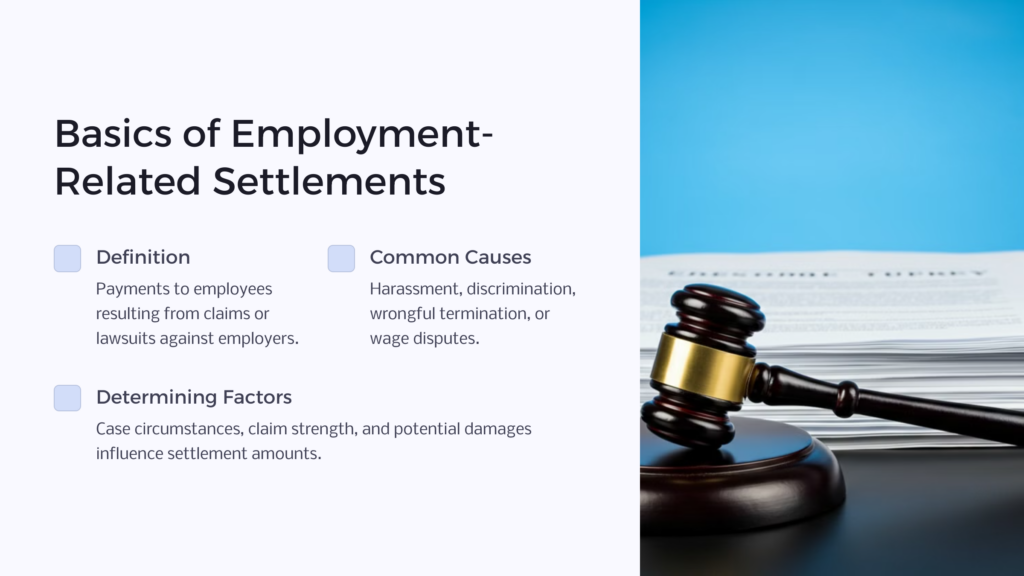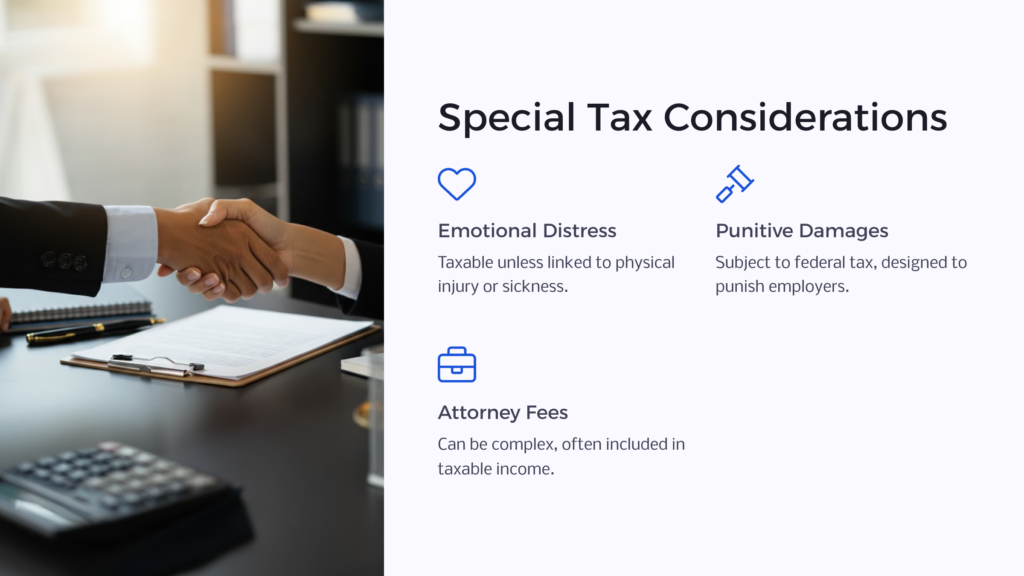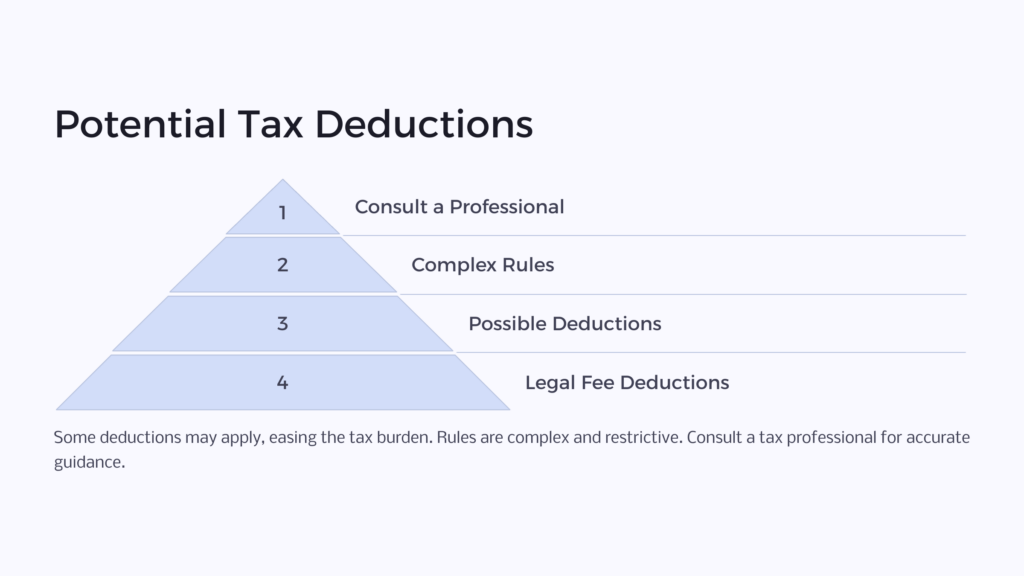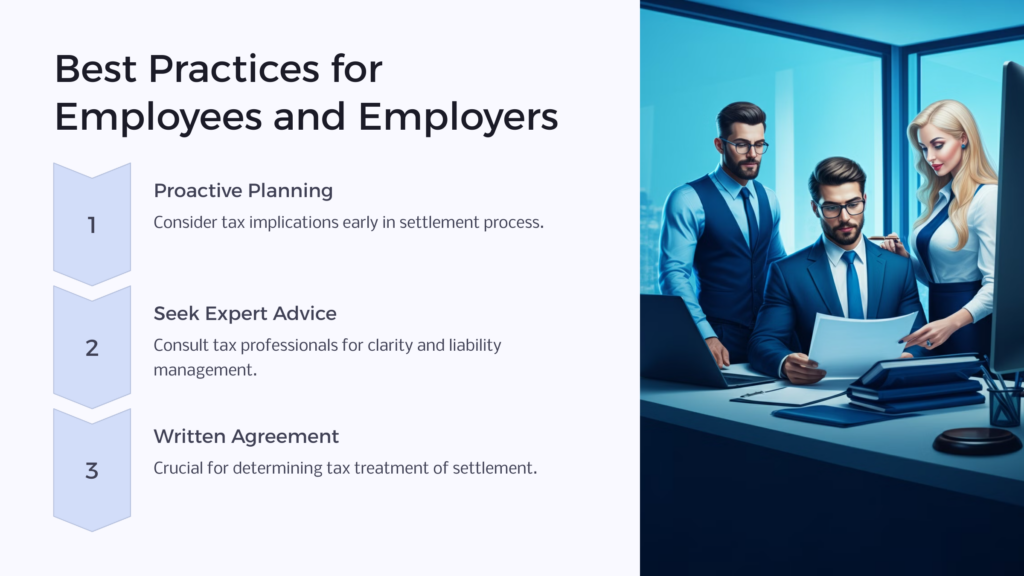An employment-related settlement payment represent an essential aspect of the labor law landscape. They represent the monetary awards granted to employees as a result of a claim or lawsuit against an employer. Understanding the nature of these lawsuit settlements and the subsequent tax implications helps employees and employers alike navigate potential financial disparities efficiently. The importance of the topic, therefore, cannot be understated given the dividing influence that tax consequences might play in structuring or finalizing such claims.
Basics of Employment Related Settlement Payments

1. Defining Employment Related Settlements
Employment-related settlements refer to payments made out to employees because of a claim or lawsuit against their employer. These may stem from an array of issues such as harassment, discrimination, wrongful termination, or wage disputes. The size and nature of these common payments can vary drastically, often dependent on the particular circumstances of the case and its severity.
2. Circumstances Leading to Settlements
A legal settlement often arises when there are disputes between an employee and their employer, particularly in instances of unlawful or unfair treatment. This could include harassment allegations, discriminatory behavior, wrongful termination, wage and hour disputes, and much more. Each case is unique, and factors like the strength of the claim, willingness of the parties to settle, and potential damages all play a role in determining the amount of the settlement proceeds.
Tax Implications of Settlement Money
1. General Taxation Rules
Typically, employment-related settlement payments are deemed taxable income by the Internal Revenue Service (IRS), as outlined in §61 of the Internal Revenue Code (IRC). However, certain exceptions can apply, making a deep understanding of these rules vital for both the claimant and the payer. Notably, IRC Section 104(a)(2) excludes physical injury or physical sickness-related damages from income.
2. The Role of IRS in Settlements
The IRS has clear guidance around the tax treatment of these payments. It characterizes these settlements as payment received for lost wages, and as such, they typically fall within the taxable income bracket, as employment tax. The IRS also mandates employers to report the payment on Form 1099-MISC if it exceeds $600, further emphasizing the need for employment settlement recipients to be cognizant of tax liabilities.
Special Tax Considerations

1. Emotional Distress and Mental Anguish Damages
In the context of emotional distress and mental anguish damages, the tax code stipulates that such payments are taxable unless they can be directly linked to personal injuries or physical sickness. Any damages received for emotional distress that do not stem from a personal injury or physical illness will be counted differently from a personal injury settlement and should be reported as income.
2. Punitive Damages and Interest
Punitive damages awarded in employment-related settlements, designed to punish the employer and deter similar behavior in the future, are also typically subject to federal tax. Additionally, any pre-judgement or post-judgement interest included in the settlement agreement qualifies as interest income and should be reported accordingly.
3. Attorney Fees
Legal fees associated with lawsuit settlements can be complex from a tax perspective. In certain cases, the whole settlement amount, including attorney fees, is considered taxable income to the claimant. This is commonly termed as the “inclusion rule,” and can result in significant additional tax liability, underscoring the importance of obtaining specialized advice.
Potential Tax Deductions

Not all is doom and gloom. Some potential deductions, credits, or exceptions could apply to these payments, easing the tax burden. It may be possible, in the case of individual taxpayers, to deduct certain legal fees incurred in the pursuit of the settlement. However, the rules around these deductions are complex and quite restrictive. Therefore, it is important to consult with a tax professional to navigate them accurately and adhere to IRS rules and regulations.
Impact of Recent Tax Law Changes
Changes in tax law can dramatically present new challenges and possibilities when it comes to the taxation of settlement payments. Notably, the 2017 Tax Cuts and Jobs Act brought about significant changes to the taxation of settlements. One of the most important ones was the suspension of miscellaneous itemized deductions, affecting the allowance of legal expense deductions in some employment settlement cases.
Best Practices for Employees and Employers

For both parties involved, considering the tax implications of settlements should land high in the list of priorities. Proactive tax planning, possibly with the help of a tax professional, will not only provide clarity but also help manage potential liabilities. A formal written agreement is also crucial as it can impact the tax treatment of an employment-related settlement payment. Always remember, the taxation of settlements is an area that requires expert advice.
Conclusion
In an ever changing tax landscape, understanding the tax implications of employment settlement payments is crucial. It exhibits the complex nature of these payments, the need to accurately record and report them, the potential tax deductions that may apply, as well as the impact of recent tax law change. It’s important for both employees and employers to consider these tax consequences and seek professional advice if required.
Call to Action
Please share this article with anyone you believe might benefit from understanding these complex issues. With the crucial reminder that each situation is unique and the tax laws are constantly evolving, consultations with a tax professional are strongly recommended. Leveraging professional expertise can equip one with the knowledge required to navigate these complexities, benefiting both employees and employers in the face of taxing employment settlements.
Be sure to take our quiz at Benefits.com to find out what benefits you qualify for, and we’ll be glad to help you.
 Benefits.com Advisors
Benefits.com Advisors
With expertise spanning local, state, and federal benefit programs, our team is dedicated to guiding individuals towards the perfect program tailored to their unique circumstances.
Rise to the top with Peak Benefits!
Join our Peak Benefits Newsletter for the latest news, resources, and offers on all things government benefits.




















